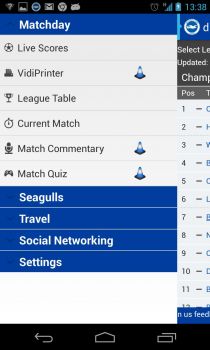Broadcast: News items
Albion united: University technology links fans by phone for promotion battle at the Amex
Posted on behalf of: Informatics
Last updated: Monday, 13 May 2013

A screen shot of the digitalStadium app, showing the match day menu

The Amex Community Stadium, home to Brighton and Hove Albion. Photo: Alison Field
It will be a testing time in more ways than one for football fans at Brighton’s Amex Community Stadium when Albion followers try out new technology from the University of Sussex during today’s nail-biting bid (Monday 13 May) for a place in the Premiership.
In between the thrills and spills of the home leg of the play-off battle against Crystal Palace, 100 Brighton and Hove Albion FC volunteers using a phone app called digitalStadium will be helping scientists at Sussex to test new software that connects fans and clubs without the need for infrastructure wi-fi.
Many football clubs want to develop better contact with fans during matches using digital technology, but the cost of equipping a stadium with the necessary wi-fi infrastructure is around £400,000.
The steel and concrete structures also make it difficult to get a signal - especially when there are thousands of other phones in use.
What makes the digitalStadium app unique is the software solution that supports it. Designed by Dr Ian Wakeman and Dr Dan Chalmers and their team at Sussex in collaboration with Brighton and Hove Albion FC and Corridor Design, the software enables smartphones to act as mobile computers and build networks with other phones in the crowd. Even small bandwith capacity can be exploited across a large group of people.
Dr Wakeman says: “With the new generation of smartphones, we can start to democratise the means of communication, helping people to pool their resources and co-operate, rather than compete for the limited resources available from the phone network.
“I'm passionate about getting computers to communicate, and passionate about football. It’s wonderful to bring the two together.”
The digitalStadium app enables fans and the club to communicate with each other during a match, providing real-time information on other key games, league table stats and travel information.
Fans can also take part in Twitter debates and competitions such as Rate the Ref while watching the game, while a live ticker feed delivers the latest news, views and special offers from the club.
The Albion’s white-knuckle tie today is the last match of a five-match development period in which avid Albion fans have been using the app and suggesting changes. There has already been an enthusiastic response.
"The app was a godsend on the final day of the season,” said Simon from Patcham. “It's hit-and-miss as to whether you can get a signal at the Amex, but the app meant I knew the ever-changing scores and league positions throughout the afternoon.”
Paul from Chichester found the App “easy to navigate”. He said: “I especially like the live score bit and the club feed even though I don’t have a Twitter account!"
And Dave M from Worthing hailed the app as “user friendly”, adding that it is “great to have all related Albion information in one place”.
Albion's head of media, Paul Camillin, says: “It's a common problem for many clubs and stadia across the globe, and not one easily solved.
“The digitalStadium team is seeking to change that via ground-breaking new technology, and we are really enthused by the progress they are making.
“The initial trials have been really encouraging.”
The Albion trial has helped the researchers to refine their software further.
The next stage will be to seek commercial roll-out for the product (currently compatible only with Android smartphones) and make the technology available to football clubs, festivals and other big events.
The University is supporting the researchers in securing a patent for the innovation and by exploring how the technology can be developed for commercial use through the University’s hi-tech business-incubation hub, the Sussex Innovation Centre.
The research is funded by the Engineering and Physical Sciences Research Council (EPSRC).

